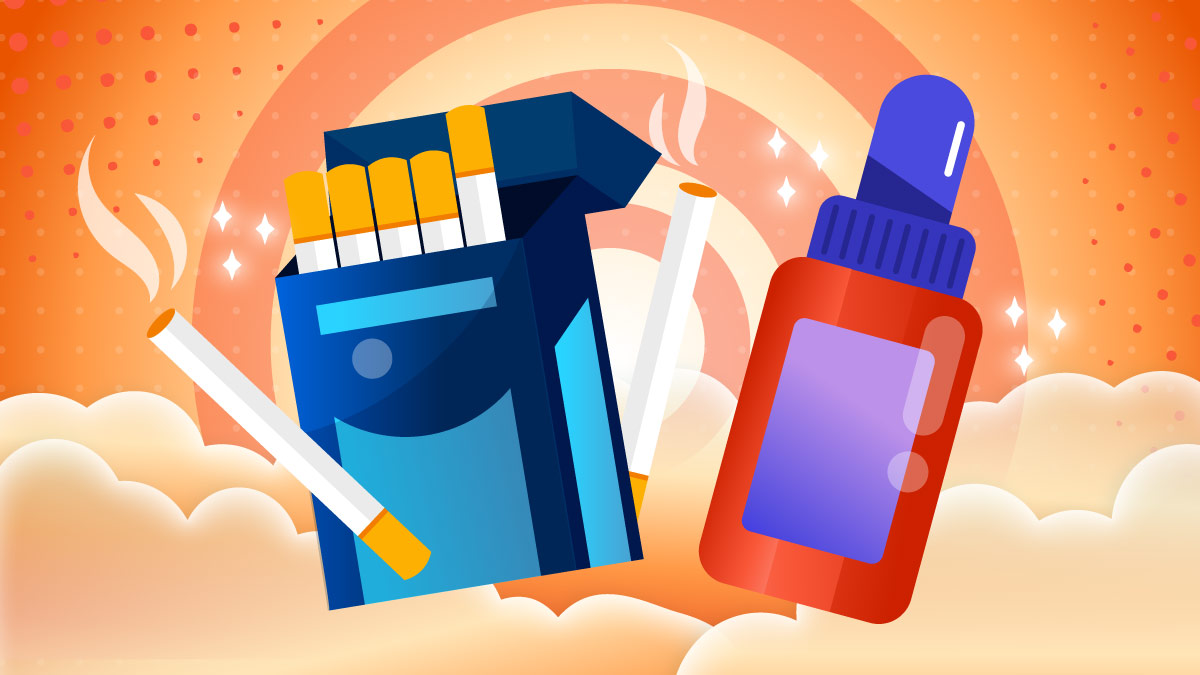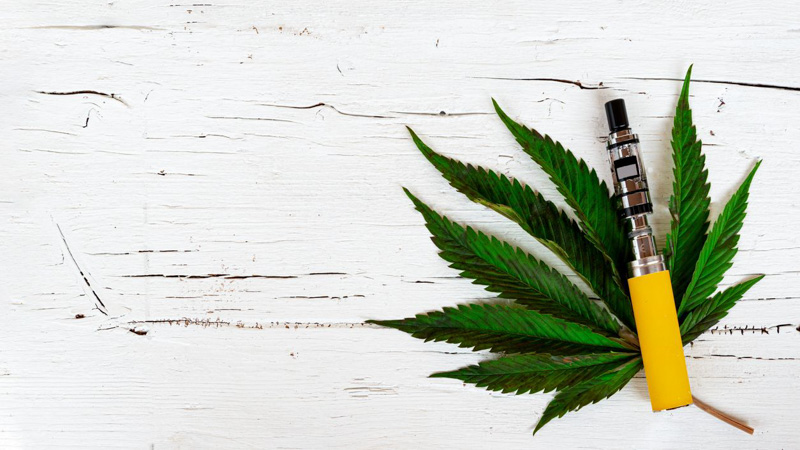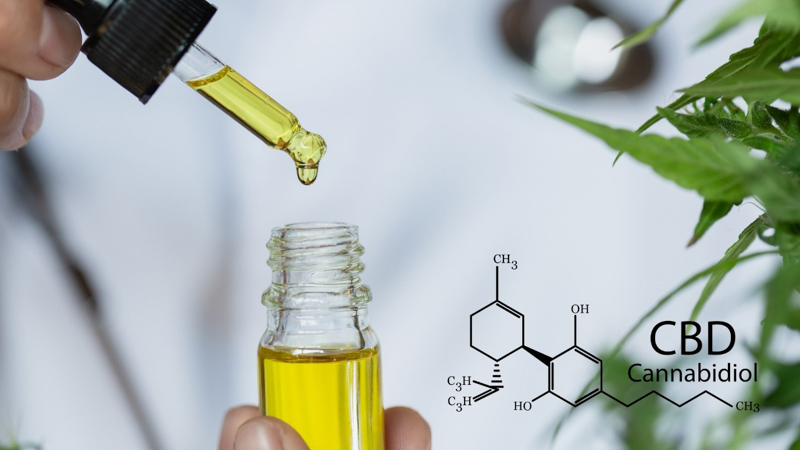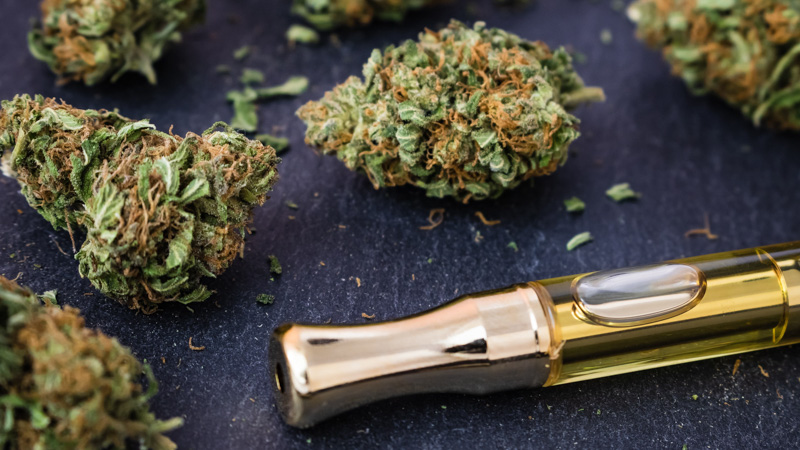CBD Oil and Nicotine: Can You Take Them Together?

After decades of misleading propaganda aimed at cannabis, many people have seen the plant as a drug of abuse, while in fact, cannabis has been recently shown to help individuals who are addicted to psychoactive substances.
Namely, it eases their withdrawal symptoms and reduces their sensitivity to addiction cues.
Some studies have even proposed that doctors should start naming cannabis an “exit drug” instead of a “gateway drug” with regards to the plant’s impact on addiction.
Current evidence shows that pharmaceutical compounds that activate CB2 receptors can be used in treating addiction to cocaine and opiates. According to some observational studies, there’s also a link between cannabis use and decreased alcohol or nicotine use.
More people are turning to CBD oil instead of nicotine gums and patches during the cessation period. They are choosing CBD because it has potential anxiolytic (anxiety-reducing) and relaxing properties while being completely safe for consumption.
CBD is also non-intoxicating, so it won’t get you high.
But, can you really replace tobacco with CBD oil? Should you take them together if you want to slowly get off nicotine?
Let’s find out.
Nicotine and Tobacco: Silent Killers
The World Health Organization (WHO) states that tobacco smoke contains high concentrations of nicotine and at least 69 carcinogens.
Tobacco is actually one of the leading preventable causes of death globally, taking away around 6 million lives each year — and contributing to large economic losses (around half a trillion dollars).
As reported by the Global Tobacco Surveillance System, which collects data from 22 countries that make for almost 60% of the global population, there are 1,300 million tobacco smokers in these places. 205 million of these smokers have tried to cease their tobacco use in the past 12 months.
Only 4–7 individuals can quit smoking without medicines or behavioral therapy, while 25% of nicotine users reach for nicotine patches and gums to ease their withdrawal symptoms.
Prevalence of Nicotine Addiction
The good news is that 80% of individuals addicted to specific substances usually recover from that addiction during their lives.
The bad news is — if you’re a nicotine user — that cigarettes have the lowest cessation rate.
Is smoking cigarettes really that strong a habit? Or does it reach beyond the physiological aspects of addiction?
Although nicotine addiction is usually associated with a brain disorder caused by a psychoactive substance, it gets strengthened by the very habit of puffing something regularly.
When people form habits around different activities, they’re more likely to get behaviorally addicted — focusing on the activities that lead to consuming nicotine rather than the very process of delivering nicotine to your system.
In simple words, the fact that you regularly hold a cig in your hand, or the habit of puffing on a nicotine vape pen, can be more addictive than the actual physical addiction to nicotine.
Animals tested in studies were more difficult to train to get addicted to nicotine, which would explain why treating nicotine addiction with gums, patches, and pills has low success rates.
CBD and Nicotine Interactions

When you check DrugBank’s BioInteractor for data on drug-drug interactions, you won’t find any information about interactions between CBD and nicotine.
Meanwhile, there have been studies that have investigated how marijuana interacts with nicotine.
Although these studies haven’t looked specifically at CBD, the data may offer some insight into CBD and nicotine interaction considering that cannabidiol is usually the second major cannabinoid in marijuana plants.
In a 2015 study funded by the National Institute of Drug Abuse (NIDA), researchers from the Center for Brain Health at the University of Texas at Dallas have learned that there’s a link between smaller hippocampal sizes.
Hippocampus is a brain region that has been studied for a long time for its profound role in memory and cognition.
According to Francesca Fibley, the study’s lead researcher, approximately 70% of people who smoke marijuana also use tobacco. However, most studies do not take this into account, throwing marijuana smokers into one bracket with those users who mix it with tobacco.
Her team’s research was the first to examine the unique effects of each substance on the brain — including their combined effects.
Future studies will need to address the distinct effects of marijuana and tobacco on the hippocampal structure, as the marijuana and nicotine interaction can be complex due to several mechanisms demonstrated by both substances.
While marijuana significantly reduced the size of the hippocampus, the relationship to memory performance wasn’t impaired, unlike with those who used marijuana in conjunction with tobacco.
Can You Use CBD Instead of Nicotine?
CBD is the modulator of our endocannabinoid systems (ECS). The ECS is the body’s largest regulatory system.
The main function of the ECS is to support and maintain homeostasis throughout the body by regulating several physiological processes, including pain perception, mood, memory, sleep cycles, fertility, cognition, body temperature, appetite, and more.
The ECS is also involved in forming addictive behaviors.
Scientists have yet to fully understand the exact link between CBD use and the functioning of the ECS, but recent research shows that CBD may play a role in treating addiction.
CBD has been linked to many neural circuits involved in forming addictive behaviors and subsequent drug-seeking activities, making it an interesting therapeutic target to help people going through opiate withdrawals, alcohol, and even nicotine.
Research on CBD and Nicotine
Only one study has investigated the impact of CBD in treating nicotine addiction.
A pilot clinical study that analyzed the efficacy of CBD compared to a placebo in the treatment of tobacco addiction reported that the cannabinoid can effectively reduce nicotine cravings and reduce anxiety deriving from substance withdrawals.
The study was a double-blind, randomized, placebo-controlled trial involving 25 subjects who smoked more than 10 cigarettes per day.
The participants were using an inhaler with CBD, and the control group received a placebo-infused inhaler. The treatment lasted for seven days; during that time, the authors of the study recorded participants’ cravings for nicotine and their anxiety markers each day.
Once the study was completed, they ran a follow-up interview 21 days after the CBD treatment. What they found was that cigarette consumption in the CBD group dropped down by 40%, staying in stark contrast with the results achieved by the placebo groups.
That being said, both groups reported the same reduction of anxiety and cravings over the treatment period.
How Could CBD Help with Nicotine Addiction?

As mentioned earlier, we still don’t know the exact mechanism of CBD’s effectiveness against addiction. However, the authors of the above study provided a few explanations based on how CBD interacts with the ECS.
According to one theory, CBD can indirectly act on the CB1 receptor. As a mild reverse agonist, CBD is able to slow down the breakdown of anandamide while signaling the ECS to produce more of this endocannabinoid.
Anandamide is a naturally-produced cannabinoid by the body that controls sensations of pleasure, fear, and addiction.
Through this route, CBD may decrease the stimulating effects of nicotine, relieving the psychological symptoms of addiction, such as irritation, poor stress management, and anxiety.
Can You Use CBD Vapes As An Alternative to Smoking Tobacco?
Vaping is becoming a popular alternative to cigarette smoking as people become more aware of the health risks of combustion.
Vaporization involves treating a substance with gentle heat; bringing it to specific temperatures, causes the substance to release vapor, which contains concentrated amounts of the active ingredients.
Once you inhale the vapor, it is delivered to your bloodstream through your lungs — ensuring fast-acting effects.
Vaping is considered a safer option than smoking because it doesn’t burn the material.
The health risks of smoking come from the combustion itself rather than the product.
Unfortunately, changing a classic cigarette to a fancy vaping device won’t solve your addiction problem because you’re still inhaling the same substance — repeating the same behavioral pattern of holding something in your hand and inhaling clouds.
That being said, many tobacco smokers have found CBD vape oils to be effective for cigarette addiction. Some studies have suggested that vaporizers can reduce tobacco and cannabis co-administration, which is logical considering that pure cannabis can be really harsh on the throat when smoked (hence the addition of tobacco).
As cannabis vapes become more popular in the future, the next generations might never be exposed to tobacco smoke or nicotine from E-cigs.
How is CBD Oil Different from CBD Vape Oil?

You can see both terms being used interchangeably, but only one of them refers to a product that can be vaporized.
CBD vape oil, also known as a vape juice, is CBD oil or distillate that has been thinned down with substances like vegetable glycerine or propylene glycol. You can buy CBD vape oils in larger containers or as smaller cartridges that you can attach to the battery of your vaporizer.
CBD oil, on the other hand, is a product that you take sublingually (under the tongue). It is not designed for vaping due to its viscosity, not to mention the waxes and oils from cannabis that shouldn’t be vaped. When you try to vaporize regular CBD oil, your device might get clogged, throwing your hard-earned money down the drain.
Learn More: Difference Between CBD Oil and CBD Vape Juice
Summarizing CBD and Nicotine Interactions
Ditching cigarettes is one of the essential steps people take to improve their health — but it can be difficult to accomplish.
Around 70 percent of tobacco smokers admit that they want to quit. However, most of them wait until they develop a health condition related to cigarettes, such as cardiac disease, stroke, or cancer.
CBD has been found to offer several health benefits when it comes to treating nicotine addiction. Not only can it lower your sensitivity to addiction cues by acting on the cannabinoid receptors in your brain, but it can also help you cope with withdrawal symptoms, such as anxiety, insomnia, and irritation.
That being said, it’s not recommended to combine CBD with stimulants, such as nicotine, due to possible side effects that may be caused by their interaction.
Although studies mentioned throughout the article suggest that CBD can be a potential therapeutic agent for nicotine addiction, there has been no clinical trial that would explicitly conclude that CBD can be used as a nicotine replacement.
If you’re considering trying CBD for nicotine addiction, consult a holistic doctor who has some expertise in using cannabidiol.
Did you try taking CBD and nicotine together? Did you experience any negative interactions? Share our stories in the comment section!
References:
- Wiese, Beth, and Adrianne R Wilson-Poe. “Emerging Evidence for Cannabis’ Role in Opioid Use Disorder.” Cannabis and cannabinoid research, vol. 3,1 179-189. 1 Sep. 2018, doi:10.1089/can.2018.0022
- Morales, Marisela, and Antonello Bonci. “Getting to the core of addiction: Hooking CB2 receptor into drug abuse?.” Nature medicine, vol. 18,4 504-5. 5 Apr. 2012, doi:10.1038/nm.2722
- Reiman A 2009. Cannabis is a substitute for alcohol and other drugs. Harm Reduction Journal. 6:35. doi: 10.1186/1477-7517-6-35 (3)
- The World Health Organization. “A guide for tobacco users to quit.” (2014).
- WHO Report on the Global Tobacco Epidemic, 2013.
- Global Adult Tobacco Survey (The GATS Atlas) – section_read
- American Cancer Society. “How to Quit Smoking or Smoke Less Tobacco?”
- Lopez-Quintero, C., Hasin, D. S., de los Cobos, J. P., Pines, A., Wang, S., Grant, B. F., Blanco, C. 2011. Probability and predictors of remission from lifetime nicotine, alcohol, cannabis, or cocaine dependence: Results from the national epidemiologic survey on alcohol and related conditions. Addiction, 106(3), 657-669; doi: 10.1111/j.1360-0443.2010.03194.x; (8)
- Filbey, F. M., McQueeny, T., Kadamangudi, S., Bice, C., & Ketcherside, A. (2015). Combined effects of marijuana and nicotine on memory performance and hippocampal volume. Behavioral brain research, 293, 46–53. https://doi.org/10.1016/j.bbr.2015.07.029 (9)
- Prud’homme M, Cata R, Jutras-Aswad D. 2015. Cannabidiol as an intervention for addictive behaviors: A Systematic Review of the evidence. Subst Abuse. 9:33-8. doi: 10.4137/SART.S25081.
- Morgan, Celia J A et al. “Cannabidiol reduces cigarette consumption in tobacco smokers: preliminary findings.” Addictive behaviors, vol. 38,9 (2013): 2433-6. doi:10.1016/j.addbeh.2013.03.011